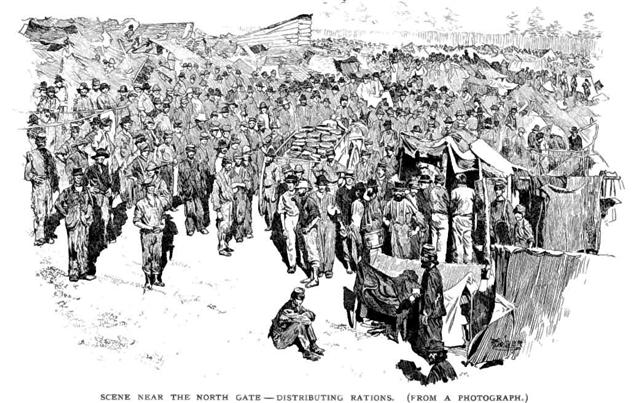
Whatever other scenes or experiences may be in store for me, none can leave the deep mark of despair or the dark forebodings which took possession of my mind that evening. It was not the confinement within the stockade. It was not the fear of starvation. It was not the fear of exposure to heat, cold, or midnight dews. It was the spectacle presented by the thirteen thousand comrades whom we first found within that inclosure: it required no prophetic powers to convince us that they could never be men again.

Our prison was an inclosure of fifteen acres; the stockade was built of pine logs, hewn square, set into the ground about five feet, with fifteen feet above the ground, and set side by side so closely that no space was left between. Upon the outside of the stockade, and near the top, sentry-boxes were placed at short intervals completely around the whole.
Inside the stockade, fifteen feet from it, a slender railing was run, known as the "deadline," the sentries being ordered to shoot any person who set foot over it or in any manner interfered with it. Every night large fires were kindled of torchwood, or "lightwood " as it was called, forming two lines of these fires, one on each side of the stockade, some thirty or forty feet outside, and intended to light up the prison, so that no secret movement could be made under cover of the darkness of the night.
Upon two sides of the stockade, and some two to four hundred yards distant, were two earthworks, one upon either side, and each mounting four cannon. These were manned at all hours of the day and night, ready at a moment's notice to pour a destructive fire of grape and canister into the crowded pen.
The stockade inclosed two side hills, a brook, small and muddy, running through the valley between, dividing the inclosure into nearly equal halves. About three acres of this valley, most of it upon one side of the brook, but a part of it upon both sides, was a swamp, and uninhabitable, it being the upper part of miles of impassable swamp which stretched off to the eastward below us.
The cook-house, where all the bread was baked and meat boiled, stood upon this very brook, above and outside the stockade, so that all the greasy scum, refuse, and dirt from it came floating through the inclosure that we inhabited, upon the surface, or mixed with the water we were obliged to drink and to use for washing. The camps of our guard were so located that all their sewerage came down through our inclosure.
In building the stockade every tree within it had been cut, and although made within a heavy growth of the beautiful Southern pineóand this same pine was not worth here the labor of cutting itónot a tree was left for a shade from the scorching Southern sun, or to furnish us with material with which to build our own shelters, to say nothing of firewood for cooking purposes.
No provision was made, until near the very close of our incarceration at Andersonville, towards carrying off the refuse and sewerage of our prison, and no sanitary regulations had been put in force. The filth that accumulated through those long summer months can neither be described nor imagined. Most of it collected in and about the three acres of swamp, and I have seen that three acres one animated mass of maggots from one to two feet deep, the whole swamp moving and rolling like the waves of the sea.
visits since _____.
Page updated
05/25/2006